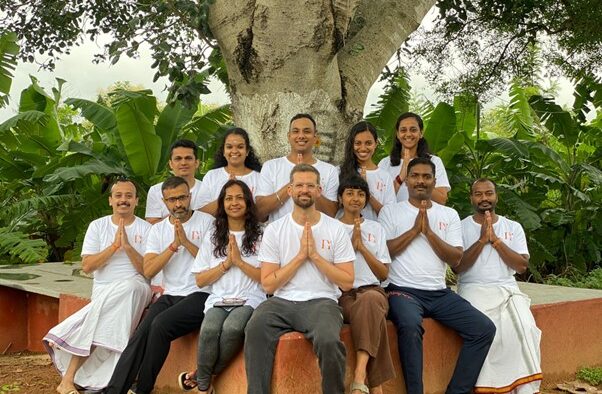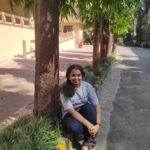I was attending an Author's Training Workshop by Indica Today when I unexpectedly met Dr Vinayachandra Banavathy (Director, Indica Yoga) on the final day. Within five minutes we had this small conversation on my passion for Indic Psychology and an intention to pursue a Yoga Teacher Training Course in the near future and he told me about the Yoga Foundation Course (YFC-1) that Indica Yoga would be conducting from September 3rd to 14th.
Thus, one thing led to another. Whilst signing up for the course I had umpteen questions running around in my head - What would this course be like? Would it be too basic given that I already had considerable theoretical exposure to Yoga? Will it be worth it in the end? And I am sure each participant had their own journeys of making it to this course.
For me, apart from a keen interest in Yoga Psychology, the faculties for this course were what caught my eye. They were scholars par excellence. Moreover, my body, which was all rundown and beaten up after months of staying at a hostel, needed this more than ever. Hence, I signed up, eager for the "Philosophy, Psychology and Practise" that the description of the course promised!
Soon I found myself with a bunch of 8 other enthusiastic people at the scenic Indica Ritambara Retreat in the outskirts of Bangalore where YFC-1 was to be held. We were taken in by the peace that this locale had to offer. Everything about this place had been carefully tended to with love. Moreover, we were from diverse backgrounds across the country and the globe. Yet something common bound us whether we knew it or not - a Quest. A quest for something deeper, higher and perhaps more peaceful than what common life has to offer. Was Yoga the answer to this quest? Or was it the beginning? We would soon find out!

From here on I will take you through key, defining moments of the Programme than going through it day by day. First let me introduce you to the raison'd'etre of Indica Yoga and consequently the Yoga Foundation Course. They stand for offering a Yogic programme that is holistic, that combines the powers of Asana and Mantra, the practises of Mindfulness, the knowledge of Sanskrit and Shastra, the science of Ayurveda and the wisdom of Vedanta.
A typical day in the 10 day-Yoga Foundation Course attempted to include all these aspects for the complete benefit of the participants. It promised to offer us insights into the philosophy, psychology and practise of the science of Yoga.
On Day 1, the learning process commenced with an auspicious Ganapati Homam and imparting of Mantra Deeksha to the seekers. The energy of the Homa was enough to tell us we were at the right place, at the right time and with the right people, asking the most pertinent questions of life!
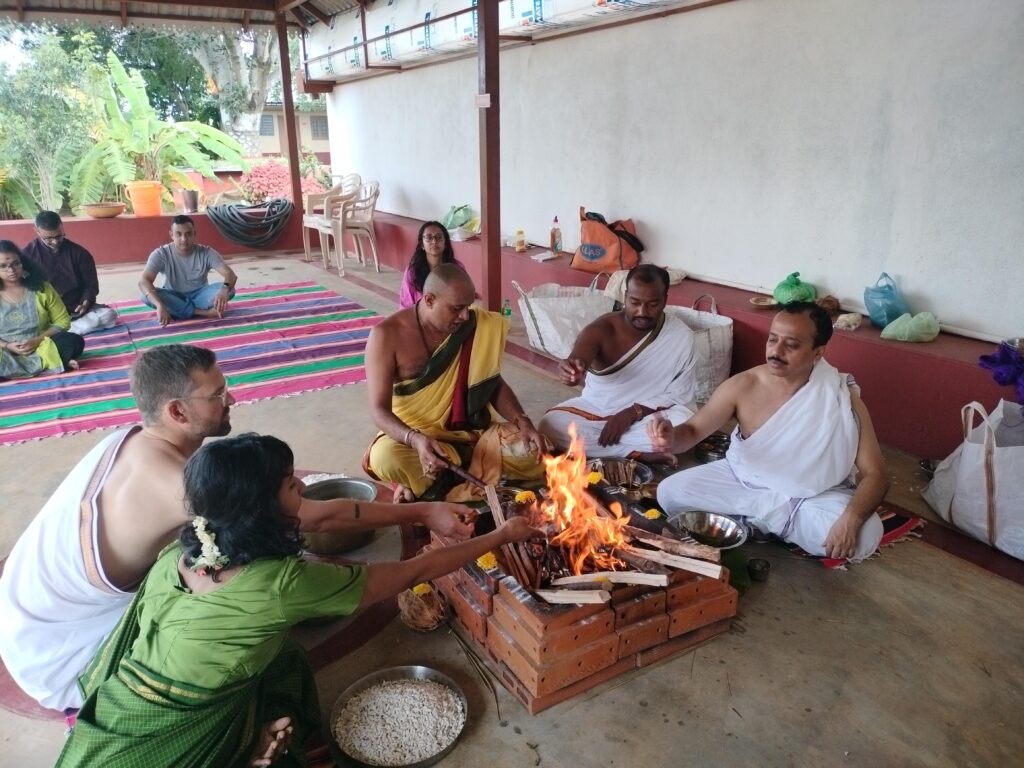
During the coming days we were scheduled to have two Asana and Abhyasa classes, two theory classes, Seva time, a Spoken Sanskrit and Vedic Chanting class and some blissful Satsang and bhajan sessions spread across the day, supported by healthy and scrumptious meals and warm, insightful dinner table conversations with the Acharyas and course cohort.
Each morning, the sonorous ring of the bill would wake us up at 5:15 AM for the Asana class led by Shri Datta Prasad. Shri Bhima Shankar would begin with a soothing meditation on ancient Sanskrit mantras which state that the infinite, primordial Brahman or the Supreme Consciousness seated within our hearts is our own true nature. Isn't Yoga but an endeavour to move from the limited to the limitless essence that is truly us?
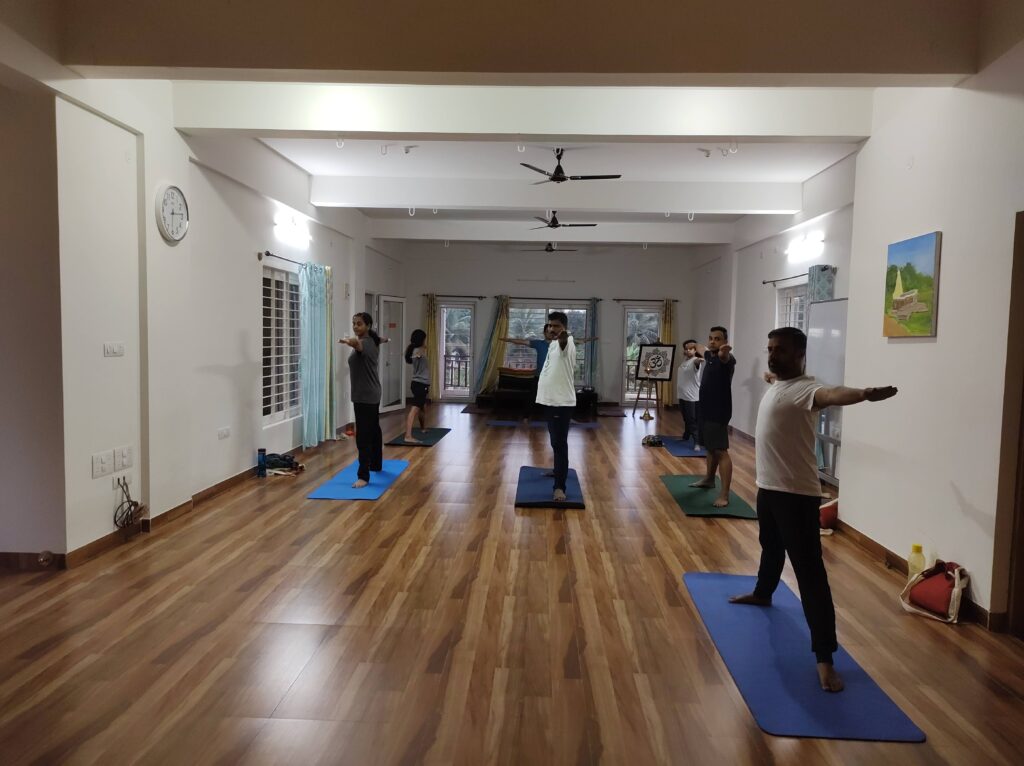
Shri Datta Prasad during his early morning as well as evening sessions took us through a vast repertoire of strength and flexibility building exercises which become mandatory for readying the body before taking up Asana practise. He followed this up with an elaborate introduction into the Surya Namaskar and guided us into the traditional way of practicing the sacred sun salutations with a devoted chanting of the 12 mantras for 12 rounds of a complete cycle.
Next, we were systematically introduced to simple Asanas and essential Pranayama’s which would allow us to continue our practise by ourselves once we would leave the course. During the class, Datta Ji continuously emphasized on the importance of posture regulation and regular practise to attain fulfilment on the Yogic path through the alignment of the body, breath and the mind. Through these Yoga-abhyasa sessions, my body was able to re-discover its health and vitality and I was realized what it meant to honor the body like a temple.
Shri Bhima Shankar guided us through the basics of Spoken Sanskrit and Vedic chanting. Classes with him were simple yet potent for they offered a glimpse of our timeless heritage nourished by the language of Sanskrit and the rhythm and depth of the Vedas. We were fortunate to be able to learn the intonations of a few of these chants as well as their meaning. Now it was up to us to take the practise further, engage in the study of Sanskrit and reflect upon the message that Veda-mantras have to convey to humankind.
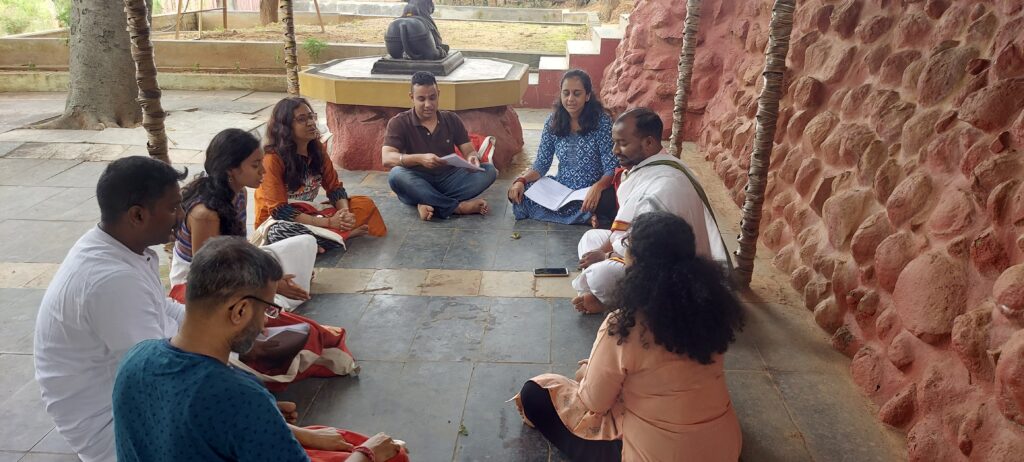
There is a Sanskrit Subhashita which states that with true knowledge comes humility and good conduct. The theory classes were conducted by scholars and practitioners who not only shone in knowledge and expertise but also radiated humility and warmth. They gently guided us into the fascinating universe of Yogic philosophy supported by the therapeutic aspects of Ayurveda and the eternal wisdom of Advaita Vedanta. The knowledge they imparted in this short while was so vast that even towards the end of 10 days, we knew we would be assimilating it for a long time to come!
Dr Vinayachandra and Dr Jayaraman (Director of Textual Research, Indica Yoga) were our core faculties for the course. With them we learnt that Yoga was all about growing and outgrowing, learning, unlearning and relearning - at the end of which lies total absorption in the Self.
Dr Vinayachandra took us through the origins of Yoga in the ancient texts of Bharatavarsha such as the Vedas and the Upanishads to the Bhagavad Gita and the writing of the Yogasutras, complete with an introduction to essential Sutras and the practical psychology enshrined in them. During the evening Satsangs he would guide us to experience what we learnt in the theory classes through brief yet insightful meditations and stories from the various Upanishads.
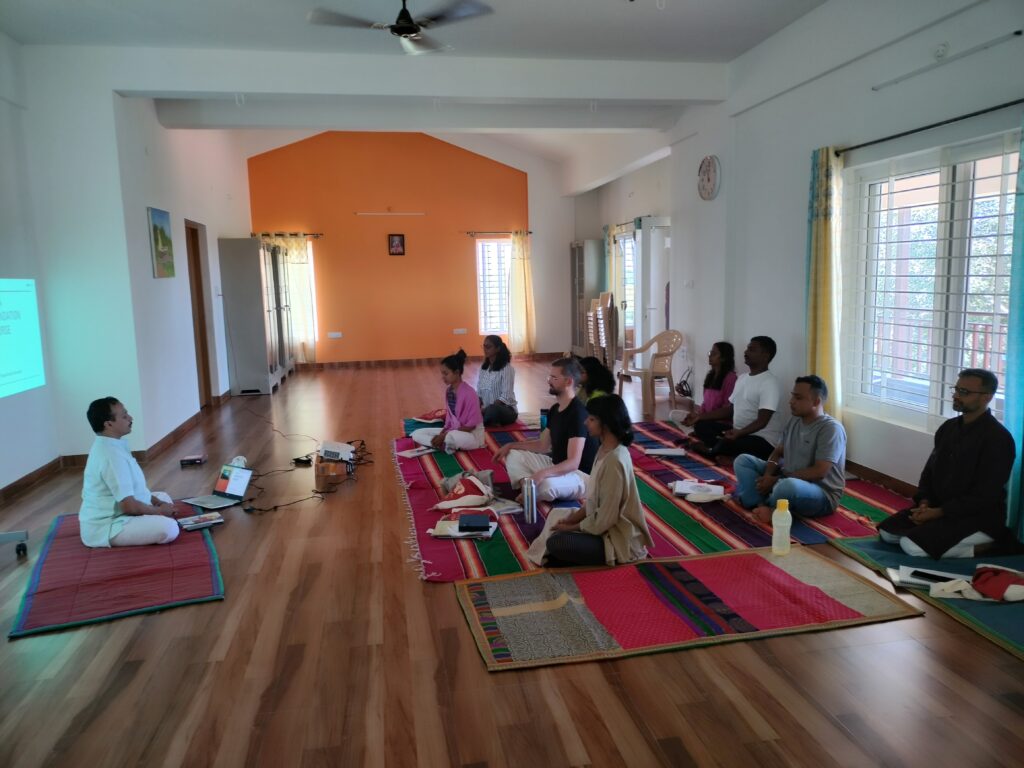
We dwelled upon Death as a powerful teacher, experienced the magnificent silence of the sacred Omkara, wondered what was our Chitta Bhumi and questioned what is Brahman and our relationship with this Truth. What he offered was a perfect blend of theoretical and contemplative learning of truths that have been passed down to us by the Guru Parampara of Sanatana Dharma.
Dr Jayaraman's challenge was to take us through the Hatha Yoga Pradipika and the Bhagavad Gita, both voluminous texts within a short span of time and he did so with elan! Knowledge flowed out of him to us like nectar and all we could do was sit in rapt attention, trying to grasp whatever we could. By the end we learnt that the Pradipika also spoke about where one should practise Hatha Yoga, how a Yogi must live and eat and he can contribute to nation building aside from the core literature that dealt with Asanas, Mudras and Bandhas.
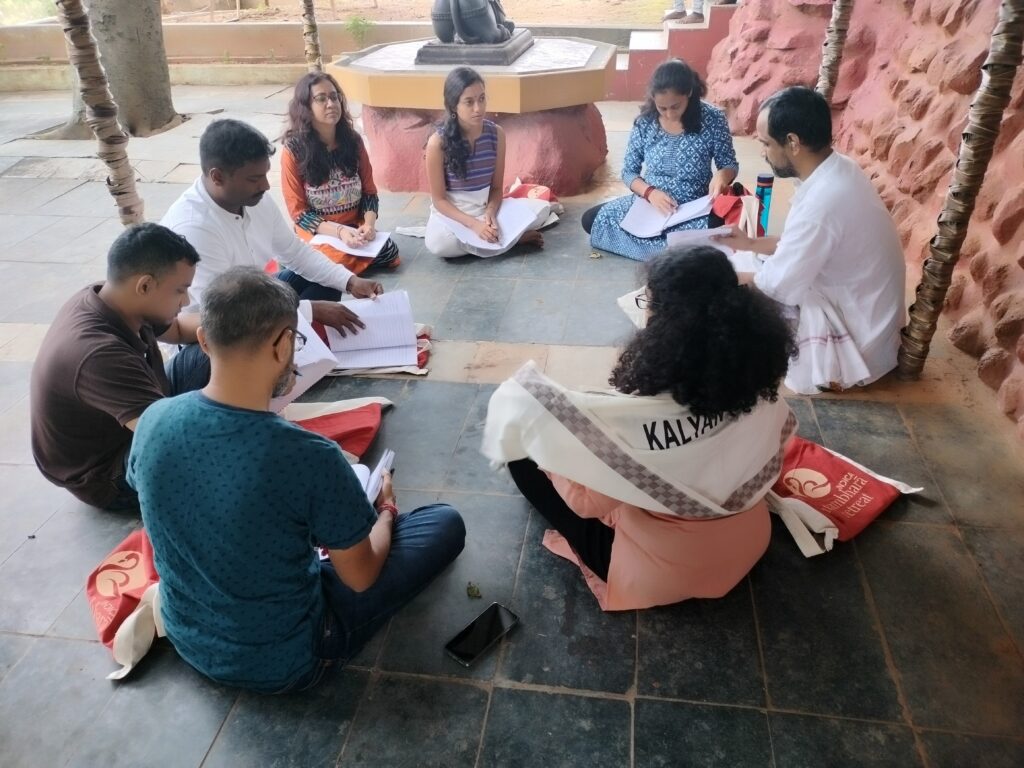
When giving us an introduction to the various Yogic paths laid out in the Bhagavad Gita, Dr Jayaraman laid special emphasis on Karma Yoga and offered a unique interpretation of this oft-discussed path. He offered us the enthusiastic energy of a child and the age-old wisdom of an erudite scholar wrapped into one. During the Bhajan sessions, his melodious compositions on Shri Bhagavathi, Shri Rama and Shri Krishna stole our hearts away!
The core faculties were ably supported and complimented by Dr Mayur Kaku (Yogic Neurosurgeon), Dr Ramesh (Ayurvedic Physician) and Dr Anuradha Choudhary (Coordinator of IKS Division, AICTE).
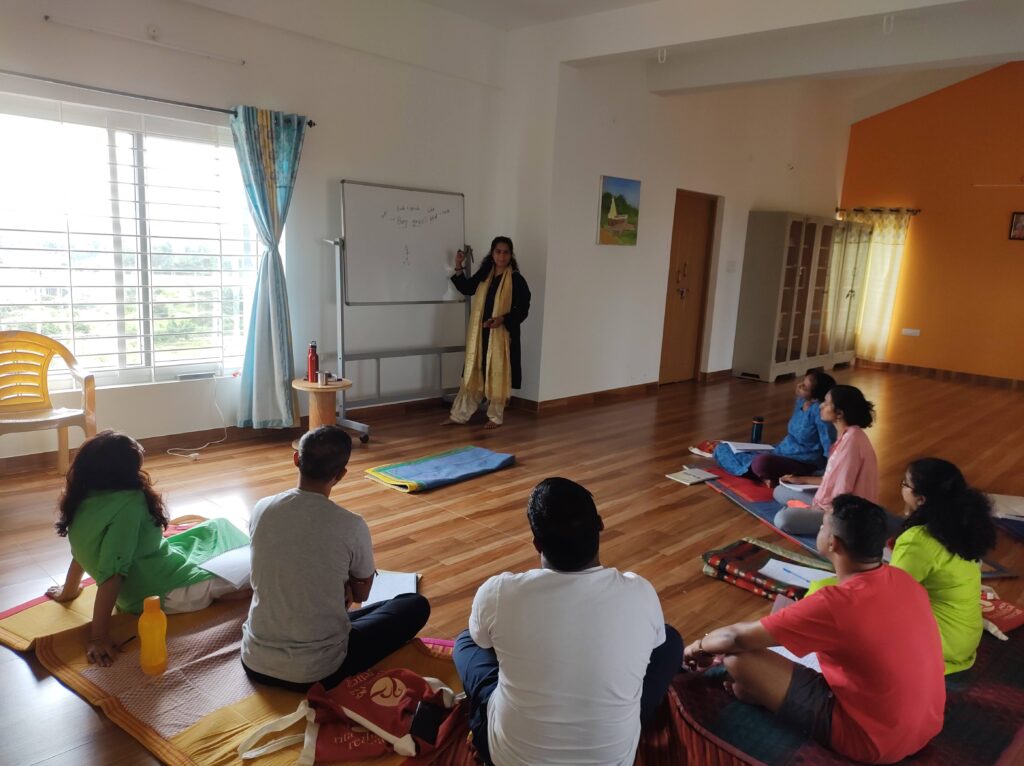
Dr Mayur explored the healing powers of the Yogic science through a practical Brahmamuhurta Yoga class - which means we woke up at 4:15 AM that day! Surprisingly none of us felt tired post the session or during the day. We were also energized with the brief Yoga Nidra session that he conducted for us. He took us through his own journey as a Yogic neurosurgeon with stories of how he had utilized the wisdom and practise of Yoga where the effectiveness of modern medicine ended, many times preventing patients from getting into complicated surgeries and reversing life-threatening conditions.
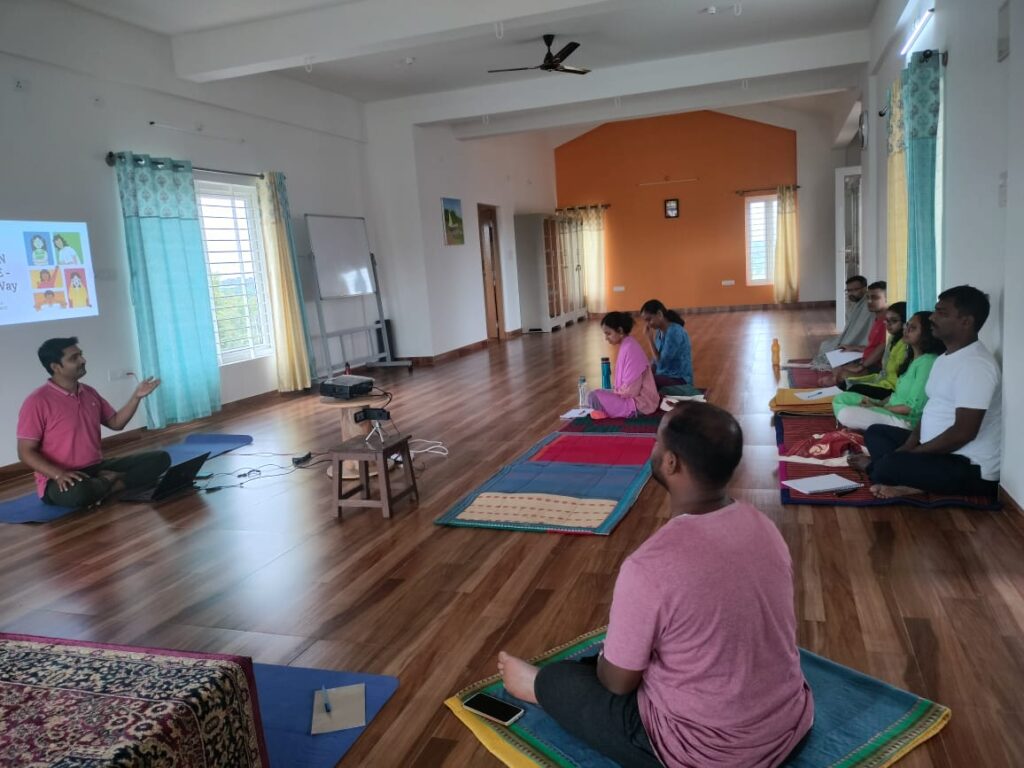
Dr Ramesh helped us glide into the world of Ayurveda. Within an hour and a half, he had introduced most of us novices to the basic essentials of Ayurvedic science and well-being. The science itself is so vast and intricate that the more questions we were asking, the more information he had to share. It certainly left us mesmerized and wanting to learn more, for it is with Ayurveda alone that the body is cleansed and purified and maintained in sacred well-being.
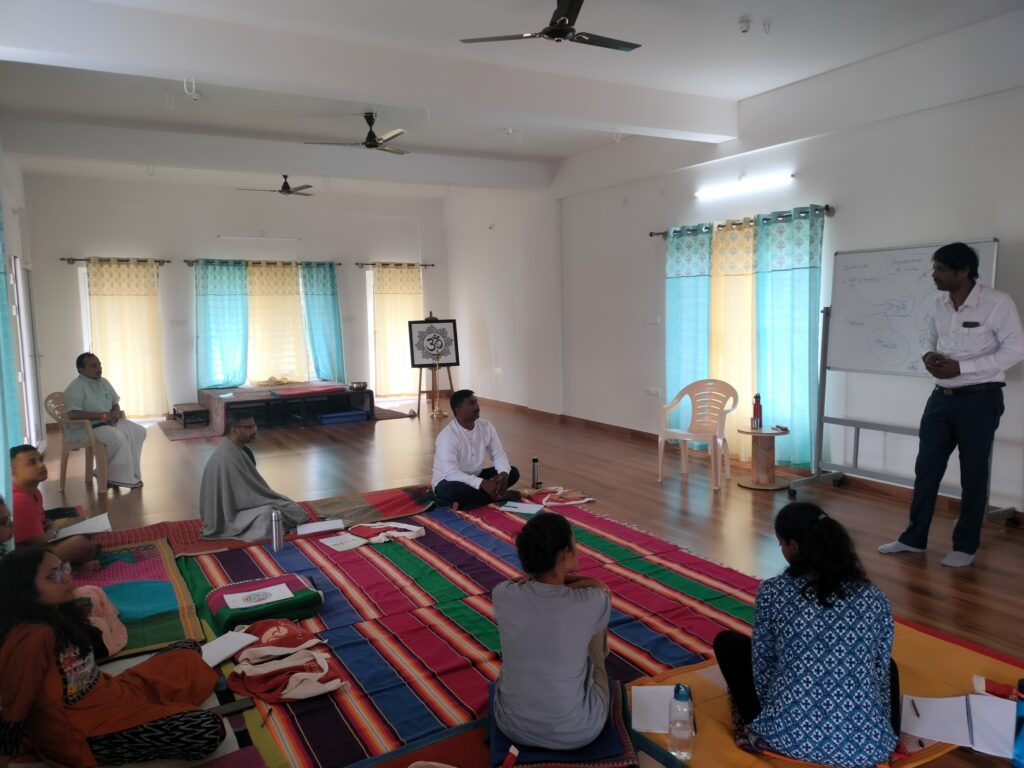
We had a surprise lecture by Dr Anuradha Choudhary, former Faculty with IIT Kharagpur for Indian Knowledge Systems and Indic Psychology. In an hour she took us on a journey to to discover the magic of Sanskrit in her own unique way. We learnt of how all four sounds of creation are enshrined in this glorious language and how our regional languages encapsulate the wisdom and consciousness of this ancient land of Bharata.
What will also stay with us forever are the surprise visits that the faculties had in store for us. On one of the days, we visited the Veda Vijnana Gurukulam, the divine abode of knowledge which had also nourished Dr Vinayachandra, Dr Jayaraman and Shri Bhima Shankar in previous decades.
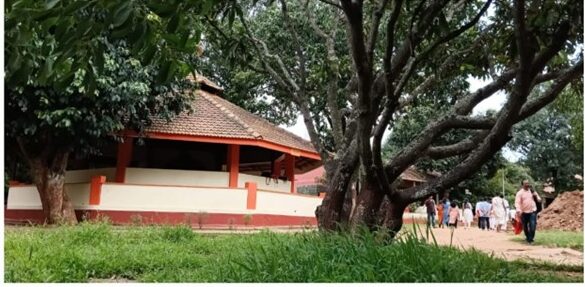
Perhaps it had always been my dream to witness how a Gurukulam functions and this was the day it came true! All of us were fascinated by the simplicity, depth and the purity of this culture and space. We were also struck by the humble order that pervaded the atmosphere as well as the dedication of the young students towards the knowledge that was being imparted.
Each student here could have possibly chosen a university education for Sanskrit, but they were chosen to be a part of this ancient Gurukula system and it is here that they will be nurtured into responsible adults who would contribute to the preservation of Hindu Culture and knowledge systems. The place was divine and peaceful and so were the great Acharyas who taught here. The highest of them was perhaps a living embodiment of the principle of oneness that Advaita talks about.
We also visited Shri Kambha Lakshmi Narasimha Kshetram, Shri Kamadhenu Kshetram and Shri Raghavendra Swamy Mutt in the vicinity. These were powerful places of silence and devotion that gave our purpose of being here, a deep sense of completion.
There were two very memorable nights for us which strengthened the bond that we formed during the course of the programme. On one night the faculties decided to organize a campfire besides the Banyan tree on the campus which was lit up with fairy-lights. It was perhaps after a long time that we sang our hearts out around a bonfire while the cold winds kept biting us. That night discovered hidden musicians in the group. Quite a lot of fun!
On the final night, we as students of the course put together a small talent show where each of us came up with equal enthusiasm and showcased whatever creative skills, we had much to the delight of all the faculties. While someone did a classical Bharatnatyam piece, someone performed Contemporary.
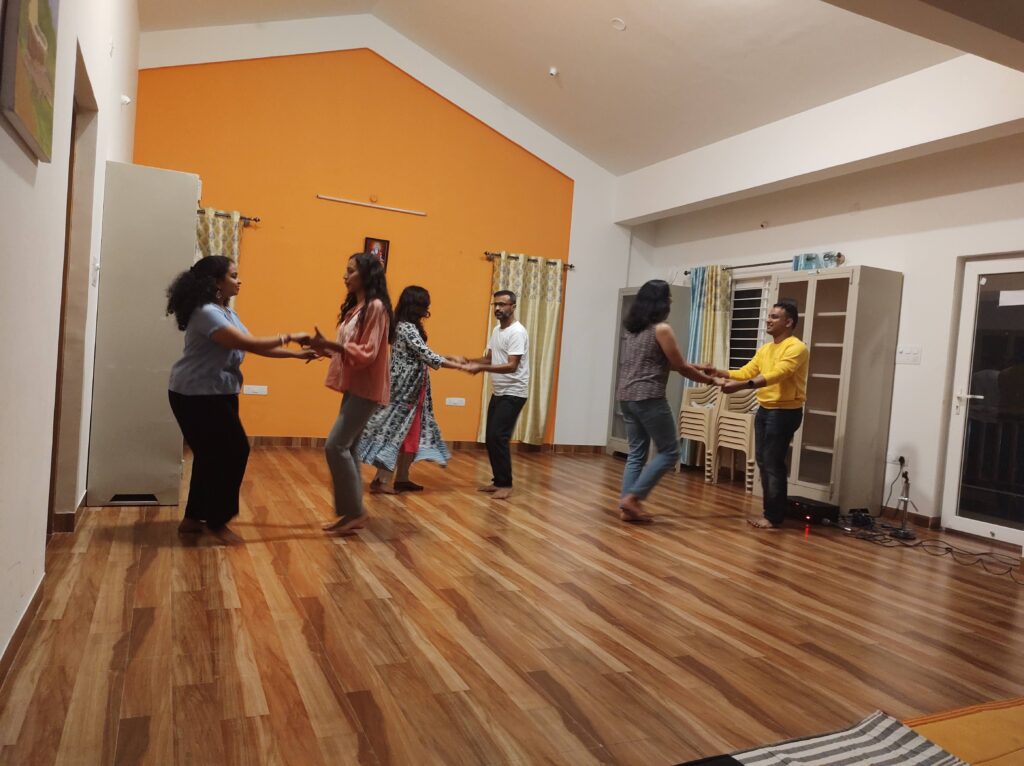
One of us sang, one compered the whole show and poetries were read out as well. What stole the show however was a group dance of an entirely foreign, fun and energetic dance form called Merengue which belongs to the Dominican Republic. Choreographed by Ms. Akshatha S Rao., one of our team members, it was not only we who enjoyed this novel experience but the audience was also taken in with the energetic camaraderie of the group!
On the final day, i.e., the 14th September we were asked to present our learnings of the course for a duration of 5-7 minutes. This was followed up by feedback and a Viva where our application of the knowledge imbibed was tested. Next, it was time for the Valedictory ceremony. It was as auspicious and mesmerizing as the Ganapati Homa we performed in the very beginning. It was a representation of the blossoming of the seeker through the contemplative activities of the past 10 days. Seated around a lamp decorated with flowers and facing the sacred OM, we started with a prayer and shared our experiences as participants of the first ever Yoga Foundation Course.
Each one had something to say about how the programme had facilitated both a learning and a healing experience. There had been a subjective awakening of sorts for all of us present there. The Acharyas of the Course also shared their own journey of curating this course, what they experienced during the 10 days and ended by showering their blessings and gratitude upon all of us. What more could we as Shishyas ask
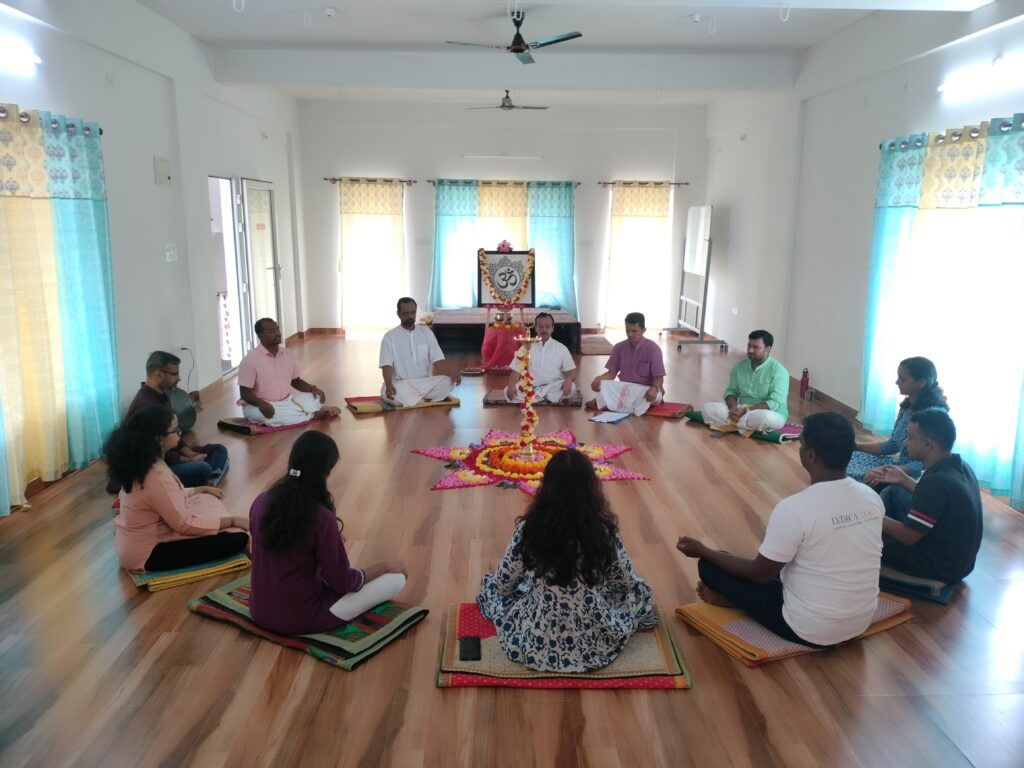
After the final scrumptious lunch topped up with delicious Gajar ka Halwa, it was time for us to pack and spend some final moments together. As each of us left the place which had given us so much, we knew we would return and continue to stay associated with Indica Yoga as an organization.
We also knew that while we were here for a brief period and had to go ahead on our own life paths, for those 10 days we had created beautiful relationships and memories that would stay in our hearts and find their way back into our lives at some point.
Finally, we were all walking away with some of our questions answered, some questions which would be answered as we walked ahead and most importantly a direction in this sacred quest within. The very first Yoga Foundation Course by Indica Yoga was thus a beautiful and memorable success for both its participants and organizers! :)
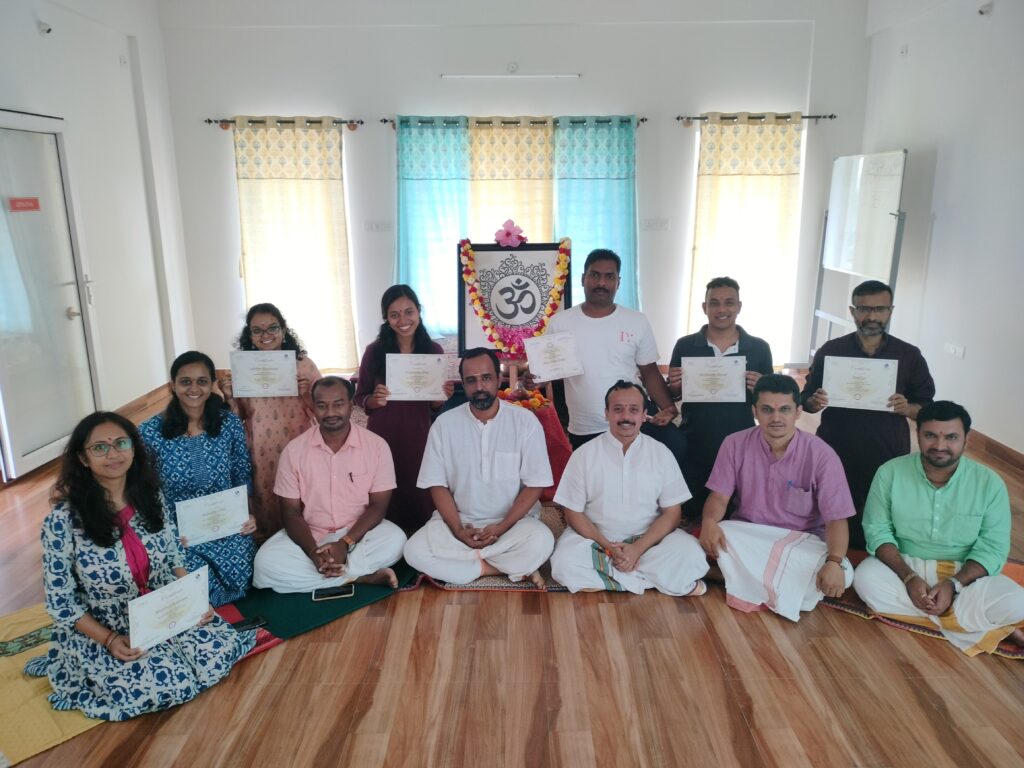
Thank you!

